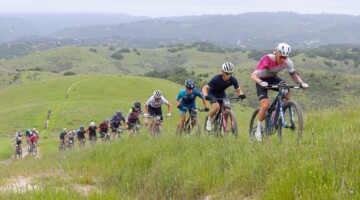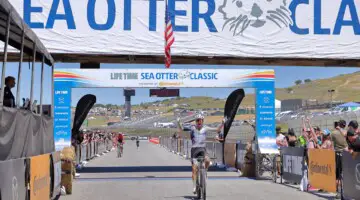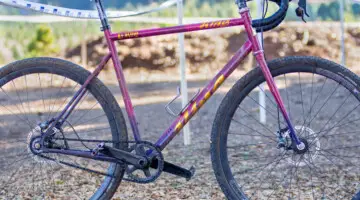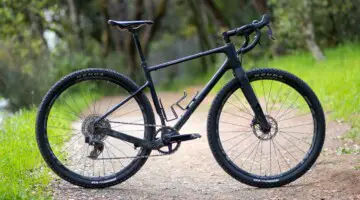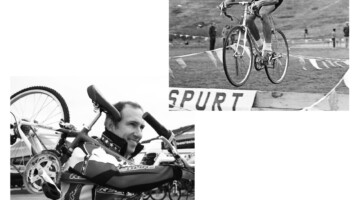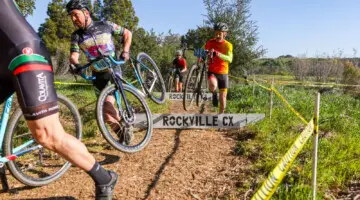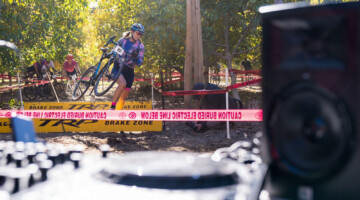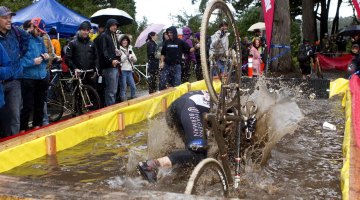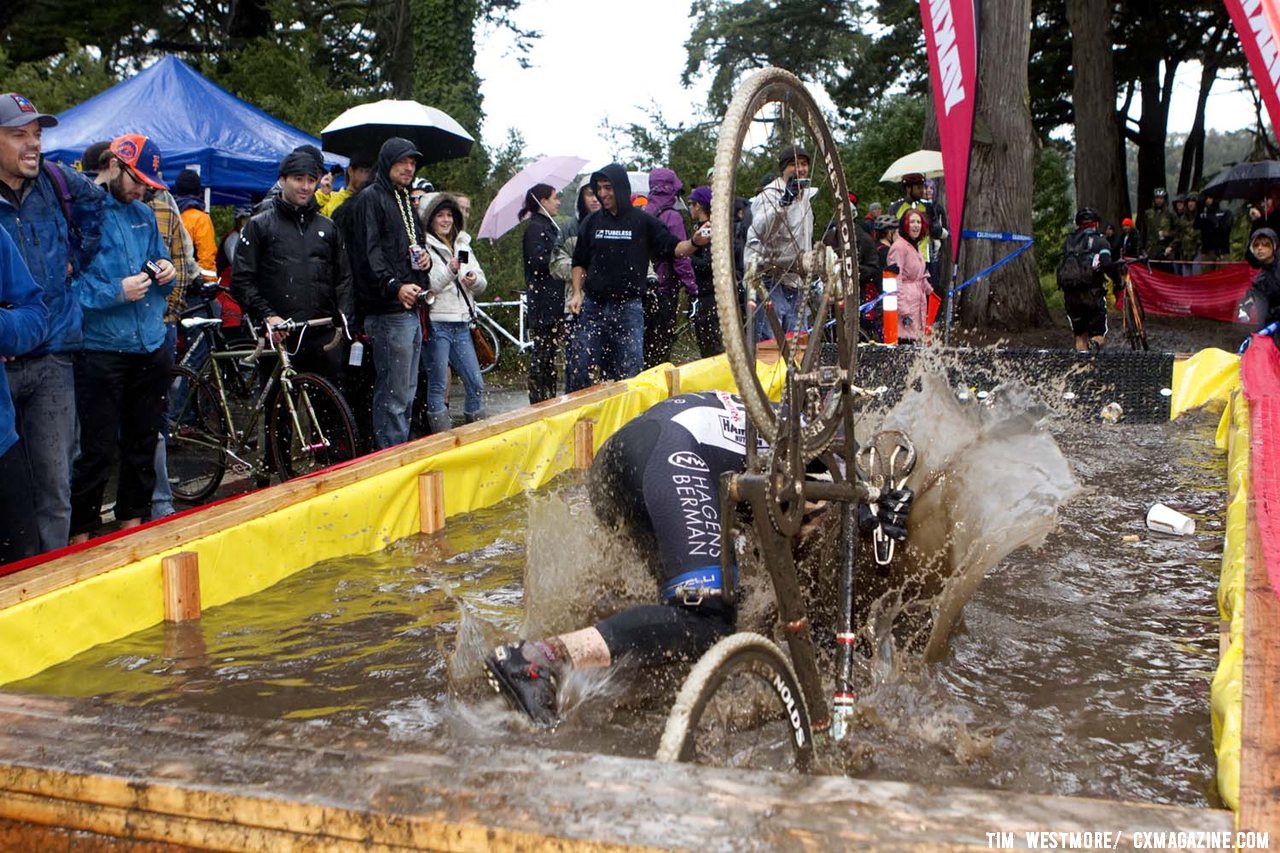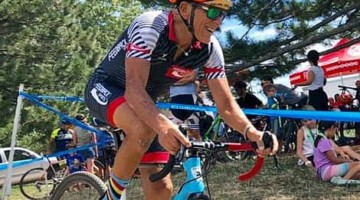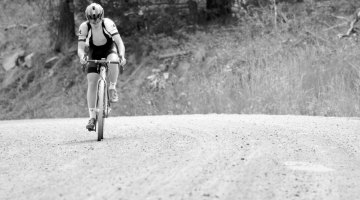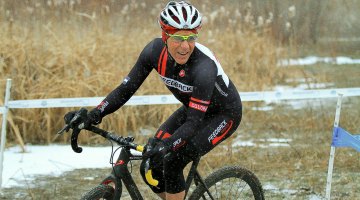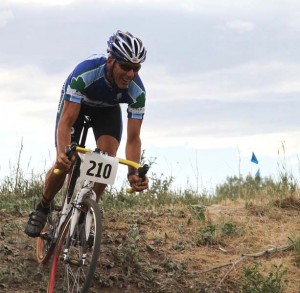
Lee Waldman in the drops, working on skills in a short track MTB race © Annette Hayden, MountainMoonPhotography.com
Cyclocross Magazine columnist and Masters racer Lee Waldman has been using a coach, getting focused and learning to enjoy his racing. In case you missed it, go back and check out Lee’s previous column as he interviews his wife about being married to a racer.
by Lee Waldman
At 60 years of age, I know that I train harder than I did at 35. Harder may not be the right word – age does matter – smarter might be more accurate. Hard days are much harder and my easy days are much easier. I’ve learned the value of rest. What’s changed, you ask? I have a coach now. Yep, for the first time in 30 years of racing, I’m paying to be tortured rather than torturing myself indiscriminately. I hooked up with Ben Turner of Cycle-Smart. What a difference! If you’re on the fence like I was, believe me, coaching is worth the investment.
I’ve worked harder with more focus than ever before. There are days when it’s a major effort to simply walk into Starbuck’s. Who do I have to blame for that beside myself? Ben.
For much of those 30 years, I’ve either trained too hard or not hard enough. I know that I missed opportunities to improve, not because of lack of desire – I have that in spades – it was ignorance, plain and simple. I was trying to fit my body and my mentality into someone else’s picture of an effective training program.
Having a coach eliminates the guesswork. I’ve read the books, followed the fitness blogs and sought out the next best thing, the training regimen that would move me to the front and keep me there. Finally, I realized that there is no silver bullet, no “right way” to train. It ‘s dedication, focus and hard, hard work. A burning question lingered though: What kind of work should I be doing? That’s where the beauty of having a coach comes in.
Gone is the brain damage of deciding how and when to train; Ben does that for me. It feels as if it’s working. This summer I’ve played with short track mountain bike racing and some endurance-type events with good results. I’ve found that my race “efforts” are much easier than they were when I was planning my own training.
Don’t think Ben’s letting me off easy – there are those days I’ve come to dread. “Surge” workouts are the worst. 15 minute intense efforts – 15 seconds out of the saddle then 45 to hold it and then right into the next one. After two sets I understand what it feels like to be totally shattered. After my first surge workout I couldn’t form complete thoughts for the rest of the day. But I know for certain that those are the efforts I’ll need to be able to make in every ’cross race I ride this year. So, no matter how much I dread them, I look forward to them as well.
It’s all about how you frame things, isn’t it? I can climb onto the bike full of trepidation, knowing I’m going to hurt for the next two hours (and I will), or I can change my perspective and anticipate the positive results. It will still hurt, but by embracing it I get more out of it. That, to paraphrase Robert Frost, makes all the difference.
As important as the coaching is though, I don’t want to ever forget why I ride my bike. The older I get, the more able I am to bring some balance to all of my life, including my life as a competitor.
I recently had an opportunity to interview Jake Wells, an up and coming cyclocrosser from Avon, Colorado [Look for that article coming soon in Issue 10 of our print mag]. There were a lot of things Wells said that resonated with me, one in particular. What, I asked, should an aspiring endurance mountain bike racer do to get better? Pick the races that are fun, he said. The ones that you get excited about riding, not the ones that you think you have to ride. Whoa, I thought, this guy really gets it. Do it because you love it. Do it for yourself, not for anyone else and not for any other reason than that it makes you feel good.
Now in mid-July when Ben is starting to ramp up my training for the fall, that’s a perfect message for me. It doesn’t mean that I shouldn’t train hard and take care of all of the other aspects of racing: rest, nutrition, mental health. It means that I need to remember why, at 60, I’m doing it. It reminds me to bring some perspective to my life as a bike racer. I’m never going to make a living racing ’cross. No one wants me on their Elite team. I’ve come to grips with the fact that I don’t have the genetic makeup to be world class, but I will race to the best of my ability because it makes me proud of myself, brings some pleasure to the people who watch me and inspires some of the younger guys with whom I race to keep going. Because if I can do it, if I can make them hurt, then there’s no reason for them to give up just yet.
Now if I were you, I’d go ride!

